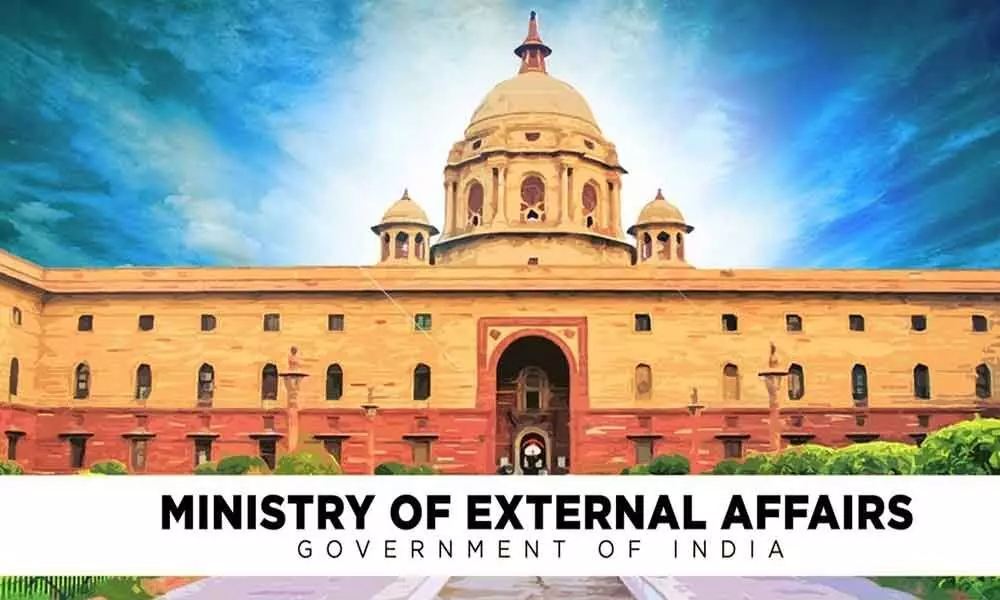NEW DELHI, Feb 9: A Parliamentary Panel has advised that the Ministry of External Affairs (MEA) should undertake a “thorough security evaluation” of all Indian missions and posts globally, considering the geopolitical climate as well as potential threats and vulnerabilities in host nations.
In its findings, the Committee on External Affairs pointed out that India presently does not maintain resident missions in 42 countries.
The committee acknowledged the challenges of establishing new missions but urged for “enhanced efforts to close these gaps, especially in nations where India has notable economic or strategic stakes or a large diaspora.”
The ‘Fourth Report of the Committee on External Affairs (2024-25) on Demands for Grants (2024-25) of the Ministry of External Affairs’ was submitted to Parliament last week, and the panel is chaired by Congress MP Shashi Tharoor.
Additionally, the committee remarked that it has “considered the criteria” for establishing new missions, emphasizing economic partnerships, strategic collaborations, diaspora involvement, and multilateral diplomacy.
“The committee has been apprised of ongoing attempts to activate missions in critical locations such as Fukuoka (Japan), Kazan (Russia), and Yekaterinburg (Russia) as well as future plans for opening five missions in Europe and the Caribbean and Latin America,” the report stated.
The parliamentary panel has also proposed various recommendations related to the security of Indian missions worldwide, reflecting the current geopolitical scenario and other considerations.
“Given the recent developments, the committee is of the opinion that the safety of Indian missions and posts abroad is vital to ensure the security of personnel, protect sensitive information, and maintain diplomatic operations,” the report indicated.
The MEA has communicated to the committee that the safety and security of Indian missions and posts are “under continuous review.”
The committee has recommended that “the ministry should execute a comprehensive security assessment of all missions/posts, taking into account the geopolitical context, potential risks, and vulnerabilities in host nations,” as per the report.
It was further suggested that sufficient resources be allocated for safeguarding both the physical and digital infrastructures of Indian missions.
These recommendations are particularly relevant given the situation in countries like Bangladesh as well as in parts of West Asia, alongside concerns raised by New Delhi in recent months regarding space being afforded to anti-India activities in Canada impacting bilateral relations.
Regarding the operationalization of new missions abroad, the committee observed that the MEA is effectively “utilizing concurrent accreditation arrangements” in states where resident missions have not yet been activated.
“Although the ministry assures that the funds allocated are adequate to handle inflationary pressures and currency variations, the committee urged the ministry to be ready to address any unexpected deficits quickly through supplementary grants to guarantee the uninterrupted operation of embassies and missions,” the report stated.
The panel emphasized in its findings that India’s “increasing prominence on the global stage” necessitates consistent and predictable investments in diplomatic, economic, and cultural engagement.
“Fluctuations and instability in the budget undermine India’s credibility as a partner in bilateral and multilateral endeavors,” it added.
The panel underscored the necessity for “consistent and predictable” financial allocations to the MEA and recommended safeguarding essential sectors from budget cuts.
Furthermore, the committee has recognized the “significant progress” made by the MEA in enhancing passport services through the expansion of the Passport Seva Programme, which includes the establishment of 93 Passport Seva Kendras (PSKs) and 434 Post Office Passport Seva Kendras (POPSKs) in collaboration with the Department of Posts.
The integration of all 193 Indian missions/posts abroad into the Passport Seva Portal is commendable, reflecting the ministry’s commitment to modernizing and digitizing passport services globally.
The committee also expressed interest in understanding the advancements and challenges associated with the construction of Nalanda University’s new campus in Rajgir, Bihar.
This university aspires to revive the ancient legacy of Nalanda as an international institution dedicated to intellectual, philosophical, historical, and spiritual studies—originating from a collaboration among India and East Asia Summit (EAS) nations.
“The ministry reported that construction of Nalanda University’s state-of-the-art net-zero sustainable green campus has made notable progress,” the report stated.
The campus was inaugurated by Prime Minister Narendra Modi on June 19, 2024.
Spanning around 455 acres, the campus features approximately 200 buildings and structures serving academic, administrative, residential, and recreational functions.
It boasts a total built-up area exceeding 20 lakh sq ft, which includes academic blocks, administrative offices, amenities, utilities, student hostels, and staff accommodations.
The committee acknowledged the government’s commitment to reviving the ancient center for learning through the establishment of Nalanda University as per the Nalanda University Act, 2010.
Despite substantial budget allocations and the completion of the green campus, the panel expressed concern over the establishment of the university being hindered by delays and operational hurdles.
Although construction has advanced and the campus was inaugurated in June 2024, delays caused by logistical challenges, disruptions related to the COVID-19 pandemic, and insufficient skilled labor have led to “significant time overruns,” the report noted.
“Despite its mandate under the East Asia Summit framework to be a collaborative global initiative, the committee finds that financial backing from member states and other international donors has been inconsistent and inadequate,” it stated.
The committee urged the MEA, together with the Ministry of Education and the Nalanda University Governing Board, to “create a more robust oversight framework to hasten the completion of outstanding tasks.”
“Diplomatic channels should be strategically utilized to secure greater financial and institutional support from East Asia Summit member states and other international allies, consistent with the University’s global mission,” it further recommended.
The committee also requested to be regularly informed about the progress made on the operationalization of Nalanda University. (PTI)


Leave a Reply